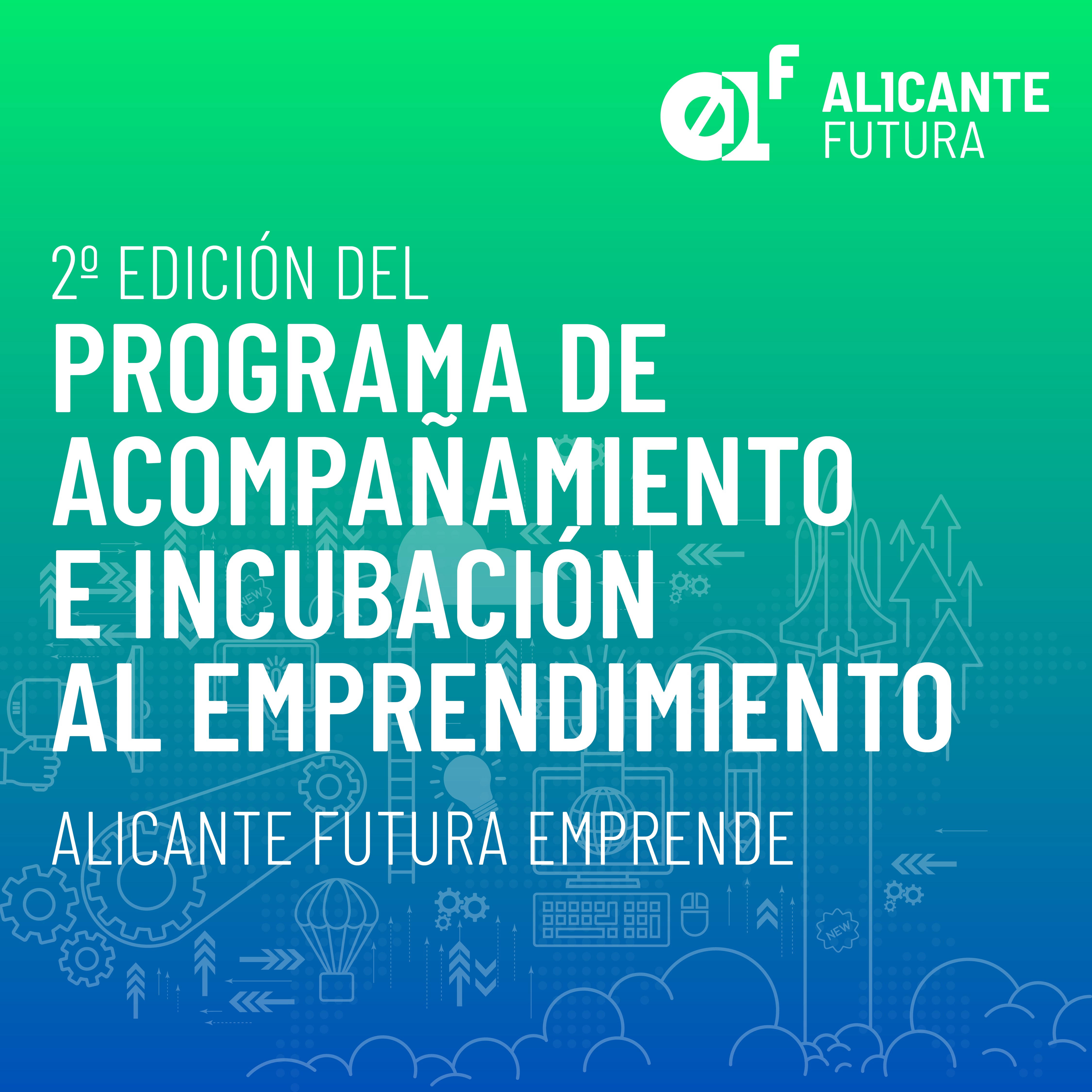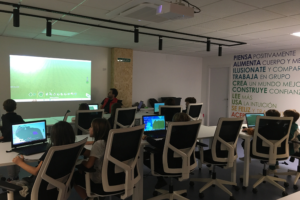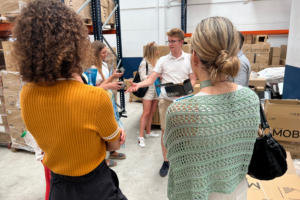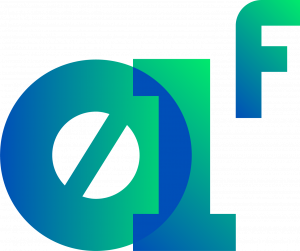ATTENTION ALICANTE ENTREPRENEURS!
Do you have a digital and technological entrepreneurship idea? Are you an individual between 18 and 65 years old?
Send us a description of your project to: eventos@alicantefutura.org to participate in the AF Emprende Program.
The Mentoring and Incubation of Entrepreneurship Program of ALICANTE FUTURA EMPRENDE is an incubation program for new business projects with a strong dynamic and operational approach, aligned with the objectives and actions of the municipal strategy ALICANTE FUTURA, and in particular, with the commitment to the promotion, visibility and reinforcement of talent made by Alicante.
General requirements:
a) It must be a feasible project.
b) It must have a technological base or incorporate some innovative element that must be described in the documentation and materials submitted.
c) It must have a business nature (vocation), whether for-profit or not-for-profit.
d) The international vocation and global scalability of the project will be positively valued, as a means of universally projecting the story of the initiatives born of the technological capital of Alicante.
e) Registration to participate in the AF Emprende Program is free for the entrepreneur.
For this purpose, it offers 3 professionals with extensive theoretical and practical experience in:
-Start-up and management of start-ups,
-Training on different areas of start-up management.
-Mentoring of other start-ups.
The mentors
This program will be carried out by a team of 3 experienced mentors, who have also worked together for several years as mentors for the European Climate KIC accelerator, the European PARSEC program and the Valencian Community LAMP 3i program.
They are Luis Esteban Domínguez, Emilio Gallego, and Israel Griol.
1.Luis Esteban Domínguez
Architect by the Polytechnic University of Valencia and with specific training in financial management (EDEM University Center), urban law (UNED), he has specialized in innovation and business development in technical areas: materials technology, product development, urban sustainability, information technologies.
During his professional career he has managed different organizations dedicated to innovation and development, currently managing the IT company OdPe (www.OdPe.es). In the field of entrepreneurship, he has been a founding partner of several companies, acquiring experience in the processes of creation and development of business models at different stages.
He has participated since 2012 in the Climate kic entrepreneurship and business acceleration programs (Venture competition, CKA, Clean launch pad), having also participated in programs of Innoenergy and the UPV.
Luis Esteban has developed his skills in leadership, innovation and development, team building and development, project management, consulting, strategic management.
2. Emilio Gallego
Specialized in business development in technological areas, Emilio studied telecommunications engineering at the Polytechnic University of Valencia, and an Executive MBA at the European University of Madrid. He is fluent in Spanish, German and English.
He has used his energy and entrepreneurial spirit to develop 4 of his own companies, as well as to intrapreneur new lines of business in other companies. He has almost 30 years of experience focused on innovation, most of them in his own companies.
He is also a trainer and mentor in the European accelerator Climate KIC and in the Climate Launchpad program since 2014. He has also collaborated with other European accelerators and programs with less intensity.since 2015 he is Professor in the master of entrepreneurship of the business school NEXT InternationalBusiness School in Madrid, belonging to the well-known journalist Manuel Campo Vidal, and since 2017 in entrepreneurship courses at the University of Valencia. He is currently founder and CEO of the startup VERAZIALLABS, S.L. of advanced biometric identification solutions.
Emilio has developed his skills in leadership, operational efficiency, team building and management, project management, consulting, marketing and sales, and strategic management.
3. Israel Griol-Barres
PhD in Telecommunications Engineering from the Polytechnic University of Valencia, with a master’s degree in systems electronics. And he completed a 3-year regional accelerator program at MIT.
He currently manages the StartUPV entrepreneurship ecosystem at the Polytechnic University of Valencia, which has helped create more than 300 startups. He is also an associate professor in entrepreneurship at UPV and in a master’s degree at EDEM and VIU (Valencia International University).
He has been mentoring startups in accelerators and programs such as IDEASUPV and EIT Climate KIC since 2014, ClimateImpact Forecast, Santander Explorer and Telefónica Open Future. International trainer of the world’s largest clean-tech startup competition, Climate Launchpad, he has trained and mentored entrepreneurs in more than 20 countries.
He has been Director of the Globalization and Microeconomics Foundation, a non-profit foundation created to promote entrepreneurship and innovation. He has also worked as a microelectronic designer at the multinational Analog Devices in Limerick (Ireland).
Why is mentoring necessary?
A start up is by definition innovative. This implies that it wants to bring to the market a product or service, of which there is little on the market. Therefore, the start up will have to prove that the market accepts the product or service. Another characteristic of a start up is that it is formed by entrepreneurs who usually have few economic resources.
Since the startup has to develop a product or service and test it in the market, it will need time to do so. And during all that time it will have to spend economic resources, which are scarce. In general, this means a race against the clock to reach the break-even point before the money runs out. Because it happens that start-ups with fantastic projects collapse because they do not have more time to get the market to buy them. It is therefore a “race against the till”. It is essential to shorten this period of time, to be able to sell before the cash flow runs out. To do this, it is essential to fail as soon as possible in the tests, and thus to be able to make the relevant modifications and even pivot as quickly as possible. FAIL FAST.
A good trainer and mentor must lead his or her mentees to achieve that goal, and thus increase the probability of success. And to do so in a personalized way, “entering” the company, advising practically from the inside.
Upon completion of a comprehensive training and mentoring program, the startup will have achieved:
-To have a validated business model.
-Have a repeatable and scalable sales model.
-Have already made sales or be in a position to do so in the near future.
-Be ready to be invested in.
-That its entrepreneurs have expanded their knowledge, in a practical way, on the management of sustart up and its risks.
The methodology used is based on the principles of lean start up and disciplined entrepreneurship. The trainer-mentor:
-Conduct a series of training sessions
-Provide the necessary support material.
-It provides specific advice for each start up.
-Guide the entrepreneurial team in the different steps of the development of their business to achieve the objectives set.And it is the entrepreneurial team that works the most on its own project, of course.
-It will put the start up in contact with the start up, and will facilitate the access to potential clients / collaborators / investors that it knows.
Work procedure
The training and mentoring period to achieve the acceleration of the company usually lasts between 6 and 12 months, depending on the level of development of the startup at the beginning, and the involvement of the founders for its progress.
Each start up, depending on its characteristics, starting point, experience of the entrepreneurial team, and capacity and attitude towards the implementation of what has been learned, will have its own “timing”. But the basic scheme, regardless of the intensity of each part in each start up, is the same. We make an exhaustive analysis of the start up. For this, the mentor will study the documentation (web, business plan, other documentation) and will hold 1 or 2 meetings.
Depending on the stage of each startup, we will work with them on the issues specified in the following phases:
- PHASE 1 of the action: Define the MARKET – PRODUCT fit (develop the business model accurately). Market segments, choice of the beachhead market, identification of the need, qualify the value proposition and then quantify it, determine the billing and pricing model, bases of differentiation with respect to the competition, determine the minimum feature set of the solution, determine the size of the target market, determine the profile of the customers and of the people involved in the purchase decision of these customers.
- PHASE 2: Validate the market (testing in real life what was defined in phase 1, and modifying where it does not work, with prospects and pilots, going to the street). Develop a repeatable sales model, define the purchasing decision unit at the customer, discover the first “early evangelists” customers who can buy, calculate the cost of customer acquisition, identify the first 10 customers in the beachhead market, develop a sales plan, determine the next 2 adjacent market segments, quantify their size, detailed cost and margin analysis.
- PHASE 3: SALES (being able to close the first real sale and access investors). Develop marketing and sales material, position the product, make sales, hire salespeople and/or sales channel, create alliances to access the market, form a balanced team, position the company, present to investors, plan to access investors.
It may be the case that one company has such a degree of development that it is in the middle of phase 2, and another is about to start phase 1, for example. The service is personalized to each one, and the mentors will adapt to each company’s situation.
A good acceleration program is articulated in a very practical way to get from idea to business, the company created and selling, in the shortest time and with the lowest possible risk. And for this it is essential to model the business with the lowest possible operating cost.
At the end of the program, the following questions will have been answered:
1.- Who is the customer and what does he/she need?
-Generic needs to be solved. Market segmentation.
-Selection of the most suitable market segment (beachhead market) and its specific description. Actions to be carried out, and analysis of specific needs for it.
-Identify the competition.
-Establish the profile of the end-user and buyer as entities of the chosen beachhead market. Establish the motivations of the decisive people in the end-user and buyer entities, and their buying habits.
-Validation techniques of the needs analysis in iterations. Techniques for interviewing customers.
-Calculate the size of the addressable market in the chosen beachhead market.
-Identify the top 10 customers.
2.-What can I do for the customer for what he/she is willing to pay?
-Complete use case flow without and with the use of our product.
-Define the value proposition and benefits for the customer.
-Define the MVP (Minimum Viable Product).
-Validation techniques of the value proposition and MVP. Iterate and pivot.
-Identify competitive advantages. Why will the customer buy from us instead of the competition?
3.- How does the customer acquire the product?
-Determine the customer decision making process.
-Determine the process to acquire the first pilot customer, and the first paying customer: Product validation.
-Determine the process and sales channel / partners to the rest of the customers.
4.- How do I earn money with the product?
-Business model design. MVBM (Minimum Viable Business Model).
-Establishment of the pricing framework.
-Customer acquisition and product development costs.
5.- How is the start-up of the company financed up to the break-even point?
- Start-up financing.
6.- How do I scale the business?
-Identification of adjacent markets – other beachhead markets.
-Development of the product roadmap.
-Obtain adequate financing for the different phases of growth.





